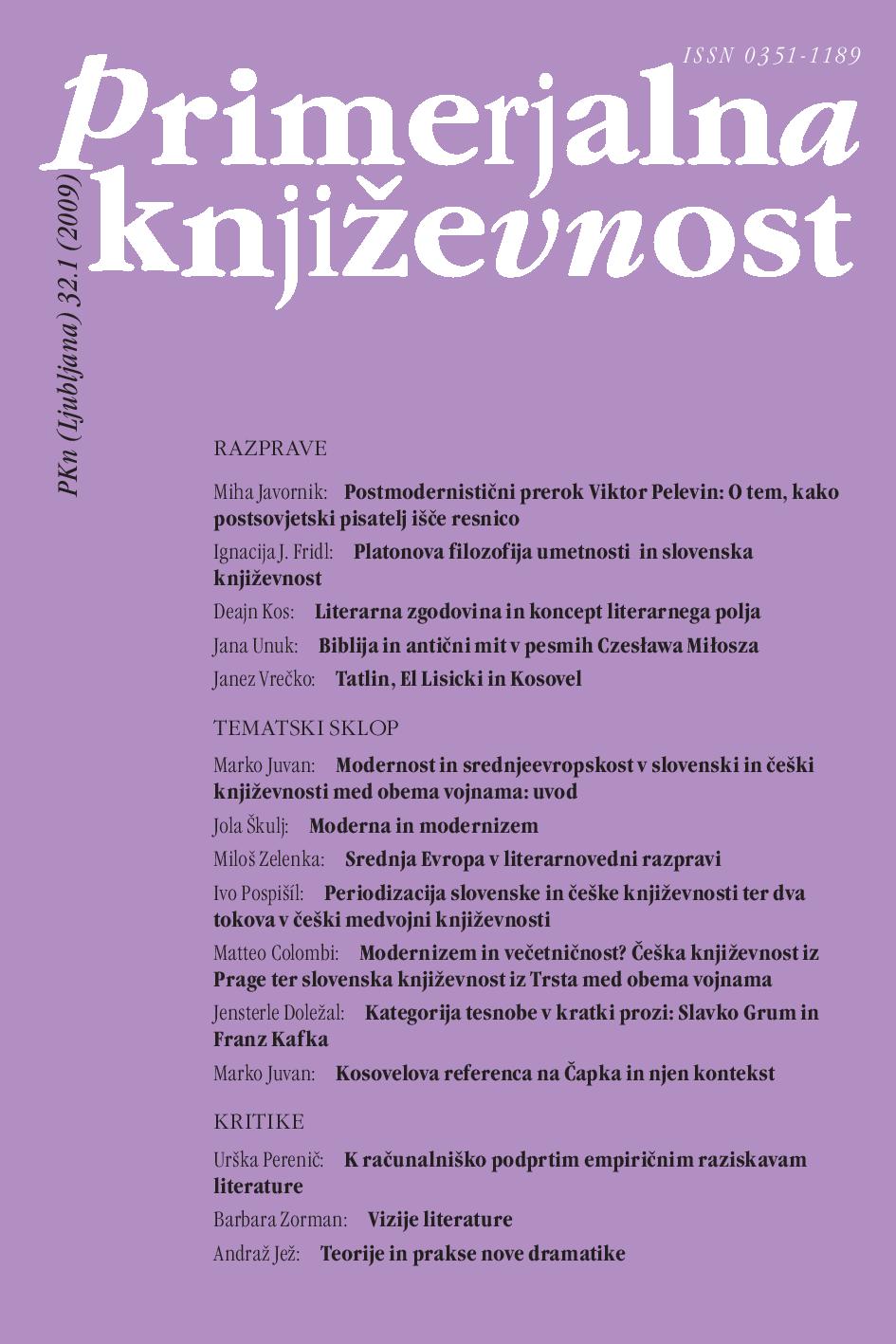Tatlin, El Lisicki, and Kosovel
Keywords:
literary avant-garde, constructivism, literature and mechanics, man machine, Tatlin, Vladimir, El Lisicki, Kosovel, SrečkoAbstract
This paper begins by analyzing the concept and term “cons” and connecting it with the typical Soviet practice of shortening words (loks, veshch′), which was also adopted by some European avantgardists (merz, mont). Kosovel used the original word cons to denote his own contribution to European constructivism; it denotes a “thing” (veshch′) in transition from composition to construction, or from a poem to cons. – Among other things, the Tatlin-Kosovel relationship can also be discerned from the manifesto Mehanikom (To the Mechanics), in which Kosovel reacts to the polemic regarding Tatlin’s “machine art” and, like Lisicki and Erenburg, tries to rehabilitate Tatlin and thus also his own constructivism. Kosovel thus talks about the “human machine” and demands a poster campaign to destroy the “human machine.” At this level, Kosovel also perceives the difference between Marinetti’s “mechanical human being” and Tatlin’s ideologically manipulated “human machine,” as understood by the Berlin Dadaists. – El Lisicki had an impact on Kosovel through his “mobile philosophy” and understanding of imaginary space. Conses are thus beyond contemplation, and urge movement, action, and a critical attitude towards the world. Following Lisicki’s example, Kosovel introduced emptiness in his conses, which changes into a plano-convex and plano-concave space, into letters in space, where there is no more perspective and gravitation. In his spatially conceptualized conses, Kosovel made his poetry dynamic and kinetic in order to reach the reader again. The use of engineering sketches, geometric material, and spatial definitions of conses effectively combined the content and form into a new organic unit, as applied in the work of Lisicki, Tatlin, and Chicherin, and in Zelinski’s constructivism. Letters grew into space; there was no more painting and poetry, but only architecture and constructiveness connected with “discipline and organization of the spirit”.References
Aleksić, Dragan. »Tatlin. HP/s+Človek.« Zenit (1921): 8–9.
Bajt, Drago. Ruski literarni avantgardizem: futurizem, konstruktivizem, absurdizem. (Literarni leksikon 27). Ljubljana: ZRC SAZU in DZS, 1985.
Berger, Aleš. Dadaizem. Nadrealizem. (Literarni leksikon 14). Ljubljana: ZRC SAZU in DZS, 1981.
Černigoj, Avgust. »Moderni oder.« Mladina (1927): 1.
Černigoj, Thea. »Ruska nova umetnost.« Naš glas (1926): 5–7.
Erenburg, Ilja in El Lisicki. »Ruska nova umetnost.« Zenit 17/18 (1922): 51.
Flaker, Aleksandar. Nomadi ljepote. Intermedijalne studije. Zagreb: Grafički zavod Hrvatske, 1988.
– – –. »Spirala/optimalna projekcija.« Pojmovnik ruske avangarde 9. Ur. Aleksander Flaker in Dubravka Ugrešić. Zagreb: Grafički zavod Hrvatske, Zavod za znanost o književnosti Filozofskog fakulteta u Zagrebu, 1984. 176.
Golubović, Vida. »Berlinska dada/Tatlin.« Pojmovnik ruske avangarde 6. Ur. Aleksander Flaker in Dubravka Ugrešić. Zagreb: Grafički zavod Hrvatske, Zavod za znanost o književnosti Filozofskog fakulteta u Zagrebu, 1989. 262.
Grübel, Rainer. »Lokalni princip.« Pojmovnik ruske avangarde 6. Ur. Aleksander Flaker in Dubravka Ugrešić. Zagreb: Grafički zavod Hrvatske, Zavod za znanost o književnosti Filozofskog fakulteta u Zagrebu, 1989. 121.
Gspan, Alfonz. »Neznani Srečko Kosovel.« Prostor in čas 8–12 (1973).
Hansen-Löve, Aage. Der russische Formalismus. Methodologische Rekonstruktion seiner Entwicklung aus dem Prinzip der Verfremdung. Dunaj, 1978.
Kosovel, Srečko. Integrali ‘26. Ur. in uvod napisal Anton Ocvirk. Ljubljana: Cankarjeva založba, 1967; 1984 (2. izd.); 1992 (3. izd.).
– – –. Zbrano delo. Ur. Anton Ocvirk. Ljubljana: DZS, 1964–1977.
Lisicki, El. »K. und Pangeometrie.« Europa Almanach. Potsdam, 1925.
Lodder, Christian. Russian Constructivism. New Haven/London, 1985.
Merz 8/9 (1924): 73.
Ocvirk, Anton. »Uvodna beseda. Srečko Kosovel in konstruktivizem.« Srečko Kosovel. Integrali ‘26. Ljubljana: Cankarjeva založba, 1967; 1984 (2. izd.); 1995 (3. izd.).
Pogačnik, Jože. »Slovenski konstruktivizem.« Obdobje ekspresionizma v slovenskem jeziku, književnosti in kulturi. (Obdobja 5). Ur. Franc Zadravec idr. Ljubljana: Filozofska fakulteta, 1984. 155–171.
Strigalev, V. O nekatoryh novyh terminah v ruskom iskustve XX. Moskva, 1976.
Troha, Vera. Futurizem. (Literarni leksikon 40). Ljubljana: ZRC SAZU in DZS, 1993.
Umanski, Konstantin. »Der Tatlinismus oder die Maschinenkunst.« Der Ararat (1920).
Weisgerber, Jean. Les avant-gardes littéraires au XXe siècle. I. Histoire, II. Theorie. (A Comparative History of Literatures in European Languages 4, 5). Budimpešta: Akadémiai Kiadó, 1984 (I), 1986 (II).
Zadova, Larisa Aleksejevna. Suche und Eksperiment: aus der Geschichte der Russischen und Sowjetischen Kunst zwischen 1910 und 1930. Dresden: VEB Verlag der Kunst, 1978.
Zadravec, Franc. Srečko Kosovel 1904–1926. Koper: Lipa; Trst: Založništvo tržaškega tiska, 1986.
Ziegler, Rosemarie. »Kručonih Aleksej.« Pojmovnik ruske avangarde 3. Ur. Aleksander Flaker in Dubravka Ugrešić. Zagreb: Grafički zavod Hrvatske, Zavod za znanost o književnosti Filozofskog fakulteta u Zagrebu, 1985.


